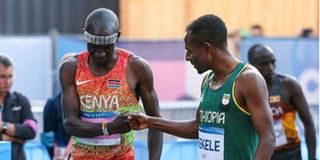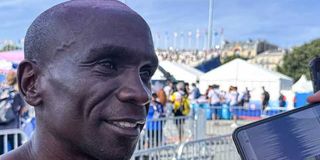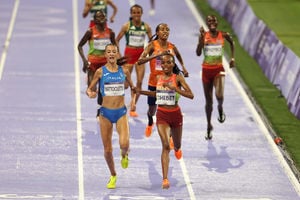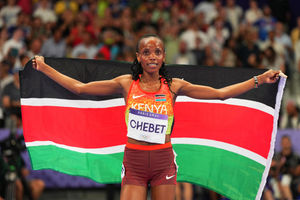
Eliud Kipchoge of Kenya bumps fists with Kenenisa Bekele of Ethiopia before the race.
In Paris
During the 19th century French Revolution, Napoleon Bonaparte ascended the French military ranks, conquering Europe after grabbing the reins of power in France in 1799.
He became emperor in 1804 and, via the Napoleonic Wars, expanded his empire across western and central Europe.
Napoleon’s rule came to a screeching halt during the Battle of Waterloo where British troops – led by the Duke of Wellington and allied central European forces – stopped the Emperor in his tracks.
The Battle of Waterloo, therefore, ended the French foray into Europe.
Napoleon’s body was laid to rest on April 2, 1861, in an imperial tomb inside a gold-topped dome at Les Invalides in Paris, having been previously interred in St Helena Island following his death in 1821.
Thus, the English expression ‘to meet one’s waterloo’ stems from Napoleon’s famous fall in the Dutch region of Waterloo on June 12, 1815.Perhaps, in anticipation of a massive upset, French organisers of the Paris Olympic Games marathon race picked Les Invalides as a symbolic finish point to the men’s and women’s races, with Napoleon’s defeated body lying less than a kilometre away from the marathon finish line. Beaten.
The main building at Les Invalides was constructed in the 17th century for injured soldiers and outside this structure, many wounded athletes would meet their Wat

Two-time Olympic marathon champion Eliud Kipchoge speaks with journalists at Les Invalides, Paris, after failing to finish the Paris 2024 Olympic marathon race on Saturday, August 10.
erloo on Saturday, August 10. after a punishing 42-kilometre course punctuated by steep inclines and sharp descents and aggravated by rising temperatures.
On Saturday, Kenya’s G.O.A.T. Eliud Kipchoge and Ethiopia’s decorated Kenenisa Bekele came sauntering past Napoleon’s tomb, battered and bruised having met their waterloo in the Olympic men’s marathon won by Ethiopian super-sub Tamirat Tola who, like the Duke of Wellington before him, conquered the challenges to beat Kenyan Samuel Wanjiru’s 16-year Olympic Games record.
Tola’s winning time of two hours, six minutes and 26 seconds was a mere six seconds inside Wanjiru’s mark set at the 2008 Beijing Games.
It was a topsy-turvy day for Team Kenya with Tokyo Marathon champion Benson Kipruto battling to bronze in 2:07:00 behind Tola and Belgium’s silver medalist Abdi Bashir (2:06:47).
Kipruto’s teammate Alexander Mutiso missed his drinks at kilometre 20 and faded to 21st place overall in 2:10:31.
The climb and steep drop between kilometre 19 and 20 were particularly challenging. “The course was tough, but I missed my drink at kilometre-20 and had to turn back, and the pack in front of me opened the gap. I tried closing the gap but my body failed to respond so I decided to run my own pace and finish,” London Marathon champion Munyao said.
“But I’ve learnt my lesson. Most importantly I’ve run with the champions and I have gained experienced.”
Kapsabet-based Kipruto described the course as extremely difficult, coupled with the rising temperatures, noting that the bronze didn’t come easy.
Kipruto, who dedicated his bronze medal to his wife Sheila and family, said he noticed Tola’s intentions in the 15th kilometre.
“I saw it was a bit early but I tried staying in touch but he went.
“The climb at about 30 kilometres was a bit sharp and the decline very steep, but I’m happy winning bronze on my debut year… It inspires me to upgrade to either silver or gold in the next race.”
Tola, 39, was only selected late in the Ethiopian team after compatriot Sissay Lemma withdrew with injury just a fortnight back.
“I was a reserve but at the last moment my friend Sissay, who is also here, asked me if I could replace him because he wasn’t feeling good…
“I say ‘thank you’ to him for giving me this chance… this medal is mine as well as his and our country,” the 2022 world marathon champion said.
Kipchoge dropped off at 30 kilometres, in disbelief, after falling to 71st position, failing to finish his first marathon in an amazing, near-flawless marathon career that has seen him win 11 majors marathons between 2014 and 2023, including five victories in Berlin (2015, 2017, 2018, 2022, 2023) and four in London (2015, 2016, 2018, and 2019).
Ethiopia’s team captain Bekele, on the other hand, finished 39th in an unfamiliar 2:12:24.
Kipchoge took journalists and officials aback when he strode into the finish area with only his short tights, barefoot, admitting that he had given his all, but suffered pain and had to drop out.
And as he walked back to the athletes’ area, a crowd of over 300 fans followed him, some asking for his running number, others his running singlet while some ambitious ones pleaded for his shoes, everyone wanting a piece of the G.O.A.T. - the Greatest Of All Time.
The two-time Olympic marathon champion conceded defeat, saying, like a boxer, he had suffered a knockout blow adding that he will assess his future in the next three months.
“I don’t know what my future holds but in the next three months I will figure out,” he said, noting that he still has a few marathons left in him and appreciating the love his multitude of fans and fellow athletes showed him on the streets of Paris.
“I could feel the love and the respect… I walked for two kilometres (after dropping out) and I had more than 300 people on my side, following me and we walked together, that’s why I’m like this… I gave out the socks, the shoes, the bib number, the vest… I was to give out the tights (shorts) but I can’t walk naked,” the legend said, sending journalists into a bout of laughter.
He described his race as “a tough day in the office.”
“Sometimes you can’t predict what will happen. You can train for a very long time but things go wrong one day…
“You can go to a boxing camp for five months and you get knocked out in two seconds. When you picture that, it’s devastating, but all in all, life will continue.”
Kipchoge, 39, said he suffered pain in his back at the 20-kilometre mark and that’s when he knew it was game over in what he described as his “worst marathon” of his otherwise glittering career.
“I decided not to finish and just jog and get out… my waist was a little bit painful and it made me drop out.”
“This is the worst marathon in my career out of my 23 marathons… I’ve never had a DNF (did not finish), but that’s life.
“Like a boxer, I’ve been knocked out – I’ve won races, I’ve become second, eighth, 10th and now I did not finish, but that’s life,” vintage, philosophical Kipchoge said.
“In sport, you fall down today, rise up tomorrow and do different things. Every day is a learning day…
“But I don’t want to talk about tomorrow because I must go back, think, internalize what has happened and move on.”
Perhaps an email sent to my inbox from one Dohán Sebestyén sums up the love and respect Kipchoge demands globally:
“I live in Hungary. My name in English is Sebestyén Dohán. I want to write to you about Eliud Kipchoge who was forced to give up the Olympic Marathon,” Sebestyén Writes.
“Runners of the world should unite and support Eliud Kipchoge! It has been a difficult year for Eliud Kipchoge. He has been slandered and threatened. I think it had quite an impact on his whole life.
“So the amateur and professional runners of the world should unite and encourage him. We are indebted to him because his life, his sporting career, his speeches motivate us and set an example for the whole world.”
I received an equally inspiring message from Strathmore University Vice-Chancellor, Dr Vincent Ogutu:
“I ran from Lavington to Ndenderu via Red Hill Link Rd and Gachie, then back.
“I dedicated the run to Eliud. He's even more of an inspiration and even more relatable now since he's experienced all the seasons, good and bad, and taken them like a sportsman.
“He continues to inspire, even more,” Dr Ogutu, an avid runner wrote.






